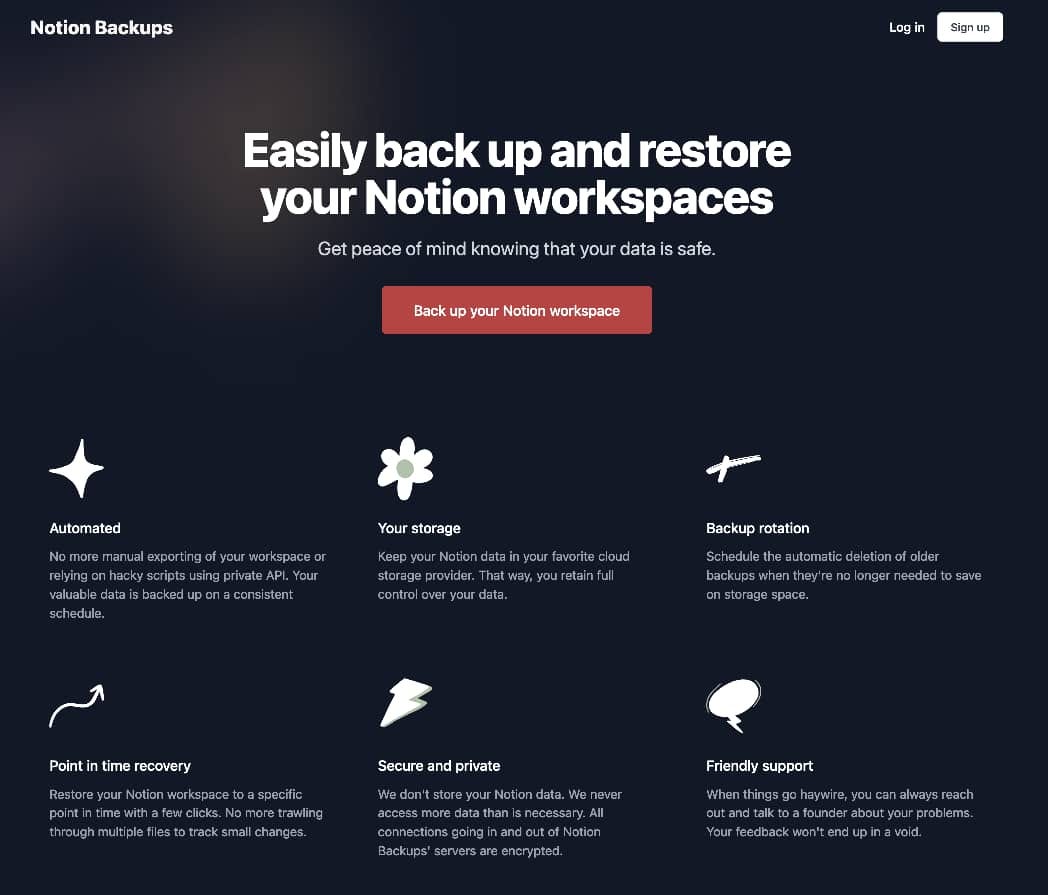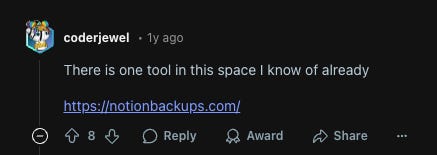Making $2,300 Monthly Backing Up Data
How this solo founder identifies a gap in a popular software tool and started a solo business around it.
Hello! Can you introduce yourself and tell us about your business?
Hey everyone, I’m Jama.
I run a small, independent software company called Notion Backups while living nomadically.
Previously, I built a small boutique consulting business and an uptime monitoring business, which I sold in January 2021.
Notion Backups is a backup and restore tool for Notion (obviously!). With Notion acting as a second brain for many individuals and organizations alike, having backups is crucial in case things go south.
NotionBackups automatically backs up your Notion data and restores it with a few clicks. While Notion has a manual "Export data" feature, it isn't automated, nor does it support restores.
How did you start this business? Take us through the process.
Back in January 2021, I sold my previous (mildly unsuccessful) business and was looking for the next opportunity.
I noticed Notion had a passionate user base that wanted an automatic backup solution, something that still doesn’t exist natively.
Once Notion announced they would launch an official API, I recognized a clear need and decided to build a backup/restore tool.
I began working on it in the first half of 2021. I put up a simple landing page to collect emails, but I made the mistake of not keeping those leads warm.
Here’s the first iteration of it:
I reused code from my previous project because reinventing the wheel isn’t necessary. The choice of technology doesn’t matter as long as you’re comfortable with it.
After a few months of working on it on and off, I launched the MVP in November 2021, and by December 4th, I had my first paying customer.
How did you get your first initial customers?
I started doing SEO before launching the product.
I bought a domain, wrote an article on developing using Notion’s API, and set up a waitlist to capture emails, so that by the time I officially launched, I already had a small group of people ready to sign up and consistent traffic from the article.
Since there wasn’t any competition back then, I managed to rank highly early on. It also helps that the most important keyword I want to rank for is in the domain itself.
It took me around a month or a month and a half after the soft launch to land my first customer. I believe it was mostly SEO that got me the first 10 paying customers. For SEO, I use KeywordsEverywhere and Ahrefs.
Once more integrations started to come online, directories focusing solely on Notion integrations began to pop up.
While it’s hard to measure, they make up a non-trivial chunk of my overall traffic and bring in subscribers.
Since launch, what are your marketing strategies or channels to get new customers?
To this day, SEO is still my main acquisition channel, along with word of mouth - especially as more users discover the service.
I owe it to Reddit users who have recommended Notion Backups a lot. I also wrote several in-depth guides, which bring a big chunk of traffic each month.
I experimented with Reddit ads, but it didn't move the needle (partly because Reddit users are skeptical about ads, and partly because Notion Backups is already well-known on the Notion subreddit).
How does your business make money?
Notion Backups is a subscription-based business. Users pay monthly or yearly.
Back in the day, I started with a single plan to make things simpler. Currently, there are 3 tiers: Lite ($6), Starter ($10), and Pro ($24). I offer generous discounts to anyone who asks.
Right now, the business’s MRR is around $2.3k.
Growth is slow but steady. My biggest expense is a beefy dedicated Hetzner server, which I got at auction for cheap - I pay about $70 per month for it.
Other costs include Postmark ($10), Xero ($20), CursorAI ($20), and ChatGPT Plus ($20). I also use Cloudflare for all my domains.
I handle everything myself, from coding to customer support to SEO (and even bookkeeping).
The only thing I outsource is tax preparation, since it’s beyond my area of expertise and mistakes could be costly.
Most of my work these days is customer support and bug fixing (and make sure servers are up and running). Since the product is mostly feature-complete, I add one or two small tweaks to make the user experience slightly better.
Where can we go to lean more about you and your business?
You can learn more about me on my personal website and Twitter page.
I also like building side projects: httpguides.com and rectangles.app







